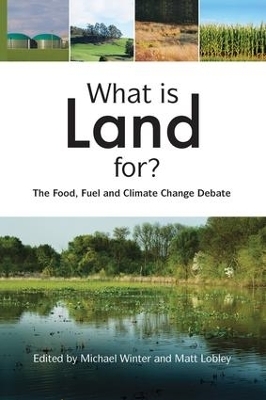
What is Land For?
Routledge (Verlag)
978-1-138-88122-8 (ISBN)
But policy and politics have not necessarily caught up with these market and industry-led changes and some environmentalists are beginning to challenge the assumptions of the new 'productivism'. Is it necessarily the case, they ask, that agriculture's best contribution to tackling climate change is to grow bioenergy crops or invest in anaerobic-digesters or make land over for windfarms? Might not there be an equally important role in maximising the carbon sequestration or water-holding properties of biodiverse land? What is Land For? tackles these key cutting-edge issues of this new debate by setting out a baseline of evidence and ideas.
Michael Winter OBE is Professor of Rural Policy and Director of the Centre for Rural Policy Research, Department of Politics, at the University of Exeter. Matt Lobley is Senior Research Fellow and Assistant Director of the Centre for Rural Policy Research.
Acknowledgements
Contributors
1. Introduction: Knowing the Land
Part I: New Uses of Land: Technologies, Policies, Tools and Capacities
2. Strategic Land Use for Ecosystem Services
3. Perennial Energy Crops: Implications and Potential
4. Soaking up the Carbon
5. Anaerobic Digestion and its Implications for Land Use
6. Watery Land: The Management of Lowland Floodplains in England
7. Ecosystems Services in Dynamic and Contested Landscapes: The Case of UK Uplands
Part II: Emerging Issues and New Perspectives
8. Adaptation of Biodiversity to Climate Change: An Ecological Perspective
9. Public Engagement in New Productivism
10. A Story of Becoming: Landscape Creation through an Art/Science Dynamic
11. Agricultural Stewardship, Climate Change and Public Goods Debate
12. Regulating Land Use Technologies: How Does Government Juggle the Risks?
13. The Land Debate - 'Doing the Right Thing' Ethical Approaches to Land -use Decision Making
14. Conclusions
Index
| Verlagsort | London |
|---|---|
| Sprache | englisch |
| Maße | 156 x 234 mm |
| Gewicht | 521 g |
| Themenwelt | Naturwissenschaften ► Biologie ► Ökologie / Naturschutz |
| Technik ► Bauwesen | |
| Technik ► Umwelttechnik / Biotechnologie | |
| Wirtschaft ► Volkswirtschaftslehre | |
| Weitere Fachgebiete ► Land- / Forstwirtschaft / Fischerei | |
| ISBN-10 | 1-138-88122-8 / 1138881228 |
| ISBN-13 | 978-1-138-88122-8 / 9781138881228 |
| Zustand | Neuware |
| Haben Sie eine Frage zum Produkt? |
aus dem Bereich


